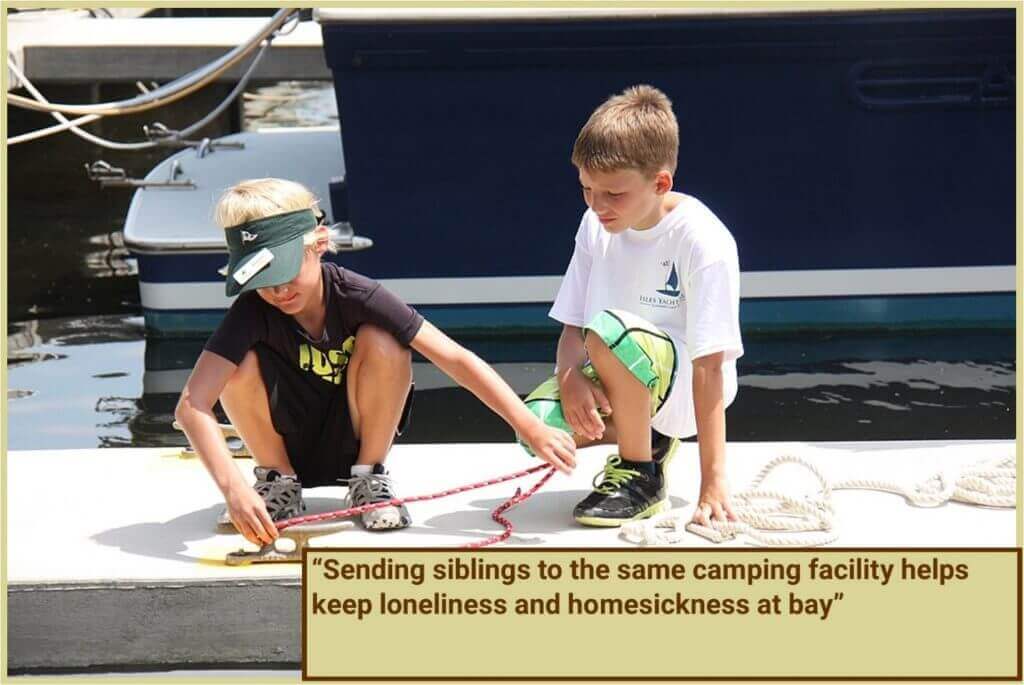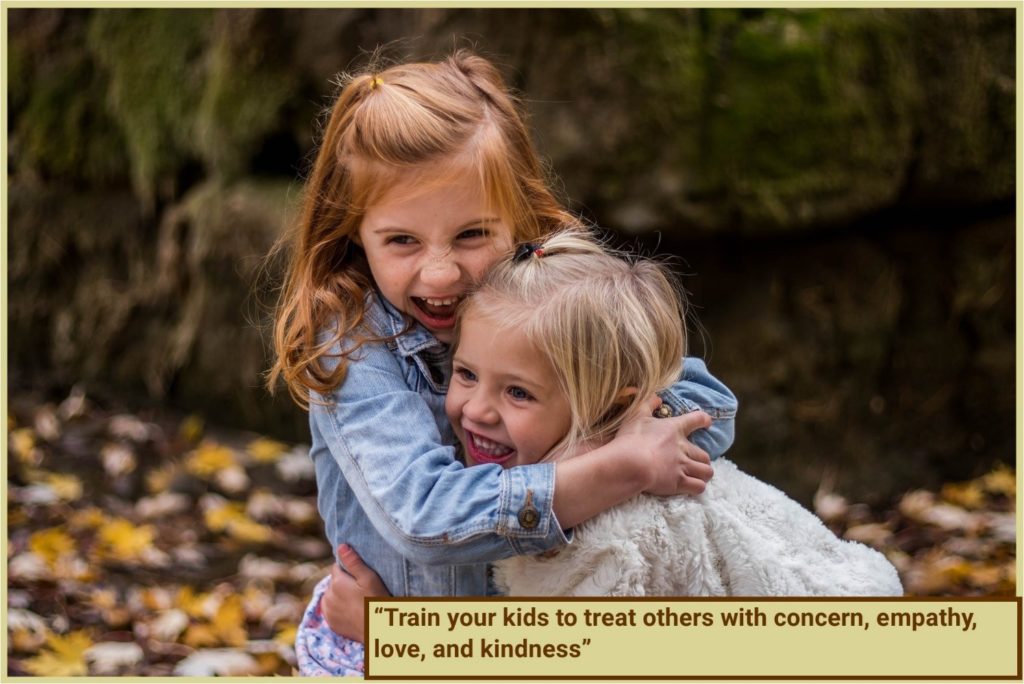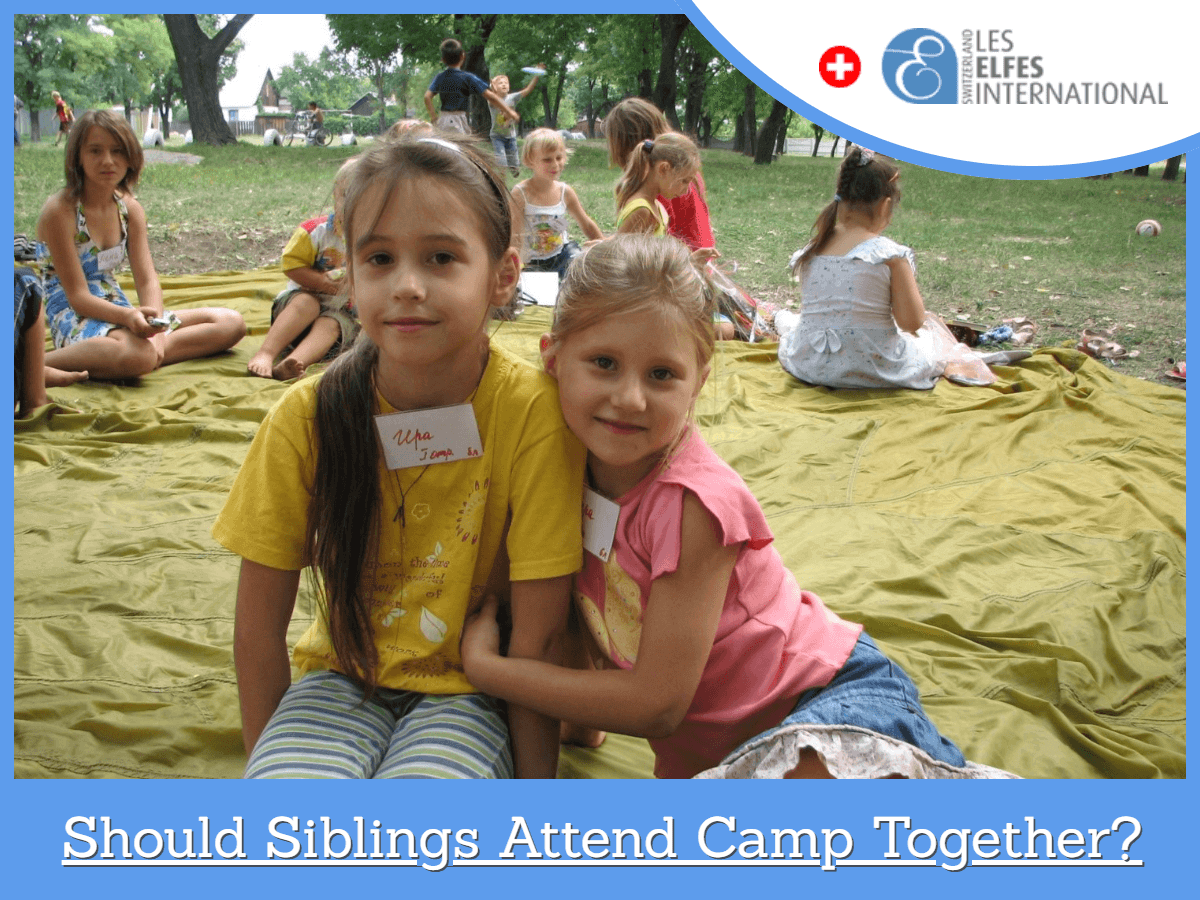Camping is not only fun and exciting, but it also comes with numerous benefits for children of all ages. As a parent, determining whether your children should go camping together can be difficult.
What with sibling rivalry cases which are common among many sisters and brothers? Did you know that sending siblings to a sleepaway camp allows them to bond? Read on to understand why a family camping experience can transform the way siblings relate with one another.
What you Should Know Before Allowing Siblings to Attend a Camp Program
Whether your children cope well or enjoy similar camp activities, there are various factors to consider before sending them to a sleepaway or day camp. You want your kids to have an unforgettable camp experience and having factual information about each child can make or break their experience. Here are some questions you should answer before you can find a camp for your kids.
- What is your child’s age? It is worth noting that a younger child may have difficulties staying away from their parents. On the other hand, older campers can adjust to separation from their parents for a few days with ease.
- Are staff members at the camping facility empowered with child protection knowledge and practices?
- Has your child been away from home successfully before? Does he or she attend sleepovers? Do they get anxious at the mention of being away from their parents?
- Does your child have special needs?
- What is the average age range for kids attending summer camp at your preferred facility?
- Is your child passionate about attending a family camp?
- What activities is your child interested in participating in during the Camp? Does the camping facility offer age-appropriate activities?
- Has the camping facility adopted effective measures to combat the spread of coronavirus?
Once you are convinced that all your children are equipped and ready for Camp, you want to ask yourself: should I send my son and daughter to the same Camp or choose different camping facilities? Regardless of the choice you make, there will be pros and cons, as seen below.
Sending Siblings to the Same or Different Camps: Pros and Cons of Either Choice
Siblings who are nearly the same age, cope well, or share common interests will have lots of fun going camping together. Apart from making new friends, they get a chance to engage in high adventure activities like horseback riding, archery, and even hiking.
At the end of the camping experience, they will have fun reminiscing and discussing their newly acquired knowledge and skills. However, summer camp enables campers to develop vital social skills while encouraging bravery and encouraging independence.

If the kids remain focused on one another, they are likely to miss an opportunity to excel individually. If your kids cannot stand one another, then choosing different camps would be ideal. You want the kids to engage in fun-filled activities without competing with one another.
Sometimes sending siblings to the same camping facility helps keep loneliness and homesickness at bay. In this case, ask the camp supervisors to place them in different activity groups and cabins. Doing so allows them to discover and enhance their individual passions and skills while exposing them to unique experiences.
What if a Young Sibling is not ready to go Camping?
According to therapists, when one child is not interested in going camping, leaving them behind exposes them to separation anxiety. Here are some tips to help parents ease the loneliness?
- Photograph the siblings together before the older one leaves for camp. The young sibling can keep and refer to the photos while the older sibling is away until they come back.
- Encourage the sibling who is going camping to write a mail to the younger sibling. Receiving personalized mail will not only excite the younger sibling, but it will also enhance the bond between them.
- Let the younger child understand that they can still attend camp with their siblings when they are older and more prepared to do so.
- Organize special activities for the younger sibling who remains behind. Remember, younger kids have an easy time adjusting to their regular schedule than older ones.
One of the most significant advantages of sending siblings to the same Camp is that you will enjoy exciting discounts. Whether you send siblings to the same or different camping facilities, consider their interests to give them an unforgettable experience.
How does Attending Camp Enhance Family Bonding?
Camping helps reinforce the bond between family members; including parents, children, and other extended family members. The success of bonding between members of the same family depends on where you spend your time.
Finding time to interact and engage in fun activities with your loved ones is an ideal strategy to complete activities successfully. Kids can even earn merit badges for the successful completion of assigned tasks.
Remember, we live in a fast-paced world, and people are getting detached from one another rapidly. Finding time to get back together can help you reconnect and relive your childhood memories.
· Families Hardly get Sufficient Time to Bond
Today, weeks have become longer, and parents are working long hours to meet the financial needs of their families. Some parents work different hours or shifts, keeping them away from the kids longer.
As technology evolves, many siblings are relying on their electronic gadgets for entertainment, reducing the moments they spend together. Unlike in the past when mealtimes were a family time, people hardly get time to share a meal and catch up with each other’s lives. As a result, there is a rapidly increasing disconnect between siblings and their parents.
· How does Attending Camp Help?
Some parents have been sending siblings to summer camp for years. Today, some parents are sending siblings to summer camps for the first time to boost their bond and help them get along better.

Whether you send siblings to a camping facility or choose to attend as an entire family, there are numerous bonding opportunities. You can opt to include your kids in the planning process to give them a feeling of inclusion and create family bonding time. As the kids make their contributions, you get a chance to learn what they are passionate about.
· Older Campers Bond Easily
Older siblings tend to get along better than three-year-olds. This group of siblings can start bonding by doing certain activities together like erecting their tents. If the camping facility allows siblings to spend time together, they can combine efforts to accelerate the completion of tasks. Doing so not only enhances their teamwork skills but also allows them to learn and tolerate one another with ease.
Did you know that 6-year-old boy scouts can help their elder siblings by executing simple tasks like passing them the hammer and tent pegs?
· Engaging in a Range of Activities as a Team
Every summer camp offers varied activities. For example, some centers allow campers to engage in cooking competitions, while in others, there is staff on standby to prepare food for campers.
Families can choose to cook for themselves or have the staff cook for them as they sit around the campfire and catch up on each other’s lives. Interacting with family members is an ideal way of learning new things about one another.
Today, many children spend most of their time on their devices, and they may end up living in fantasy. Getting them off their devices helps them get back to reality. You want to avoid exposing your kids to situations that lower their self-esteem, like social media bullying.
· Attending Camp can be some Form of Therapy
If you have kids with special needs, then sending them to a different environment renews their strength. A kid with special needs will reap excellent benefits from going camping like any other child. These benefits include:
- Exposure to rejuvenating exercises and activities such as Webelo scouter forums
- A chance to become independent and increased confidence
- An opportunity to interact with their peers and form new relationships
- Some summer camps even have oncology experts who assist kids whenever need be.
- An opportunity to meet mentors
How can Parents help Siblings Bond?
In the book, NutureShock: New Thinking About Children, authors Po Bronson and Ashley Merryman say:
“In many sibling relationships, the rate of conflict can be high, but the fun times in the backyard and the basement more than balance it out. This net-positive is what predicts a good relationship later in life. In contrast, siblings who ignored each other had less fighting, but their relationship stayed cold and distant long term.”
Every parent’s wish is that their kids can bond and get along well. Here are some tips to help you develop a significant relationship between siblings and motivate them to be friends.
· Encourage Siblings to Engage in Activities
Guide your kids towards activities that enhance their strength. For example, if one of the siblings has difficulties sitting still, have them participate in an enjoyable outdoor activity. Some activities that siblings can engage in as a team include baking a cake and cleaning the kitchen. You can even photograph them as they collaborate on tasks and frame them up.
· Separate them for Sometime
Often, remaining together for long encourages fights. Consider giving siblings a break from one another and allow them to spend time individually. You can send one of them for a sleepover event at a relative’s house and have the other remain at home.
Doing so helps them value each other more once they reconnect. When kids spend time on their own, they get a chance to build their strengths without comparing themselves to their siblings.
· Identify and Nurture Activities that Allow Siblings to Play Together
Research on enhancing sibling relationships suggests that kids relate better when they engage in activities they are passionate about. Determining these activities is not easy for kids with a wide age gap between them. However, if you watch your kids keenly, you will be able to suggest fun activities for them. For example, if one child is interested in a different activity, you can encourage them to collaborate in one activity at a time. Doing so encourages teamwork.
· Encourage Siblings to Care for One Another
Devise a family practice where when one child is hurt, everybody stops what they are doing to console their hurt sibling. Based on the extent of hurt, you can have the other children assist in tending to their brother or sister. If the injury resulted from a fight, have the victims apologize to one another.
· Let Your Children Understand and Appreciate the Fact that they are Different
Everybody has unique personality traits. One sibling may be loud and outgoing, opting to engage in fun activities with friends. Another child could be reserved and quiet, opting to sit alone in a corner and read silently.
When siblings have varied temperaments and interests, conflicts are bound to occur. As a parent, you should ensure that kids understand these differences and learn how to respect each other’s personal space.
Make sure siblings focus on loving one another regardless of their differences. If one child wants to engage in action-filled activities while the other wants to complete their BSA homework quietly, create a system that allows them to create a schedule together.
Help them discover and include activities they share in common in their programs. Recommend other fun activities that will enhance the bond between the siblings.
· Ensure Kids Understand why Respect is Critical
Respect is a critical factor in developing great relationships, and listening is an excellent method of respecting one another. Train your kids to treat others with concern, empathy, love, and kindness. Showing respect involves speaking to one another using a pleasant tone amid disagreements.

Siblings should learn that downplaying each other’s opinions is disrespectful. They should also master the art of respecting each other’s belongings and space. Adopt a family policy where siblings should seek each other’s permission before touching stuff they do not own.
· Let the Siblings Work Together to Complete Chores
Develop a sense of cooperation and teamwork among siblings by assigning them activities and exercises that promote collaboration. For example, you can get the kids to work on a particular task together or encourage them to help one another with tasks.
Some of these projects include cleaning the compound or repainting the garage walls. Make sure the chores are age-appropriate based on their abilities. Set a good example that the siblings can abide by in the future as adults.
Take Away
- Siblings can either attend the same or different camps. Regardless of the choice you make there will always be pros and cons. Understand your children and make the right decision that meets their needs.
- While sibling rivalry is a normal occurrence, parents have a role to play in nurturing sibling bonds.
Visit our website and acquire more summer camping tips.









